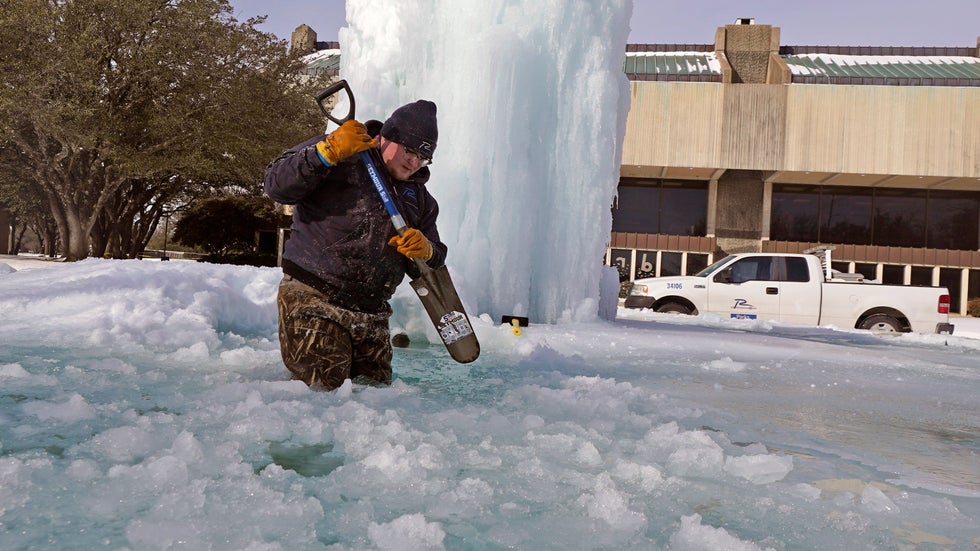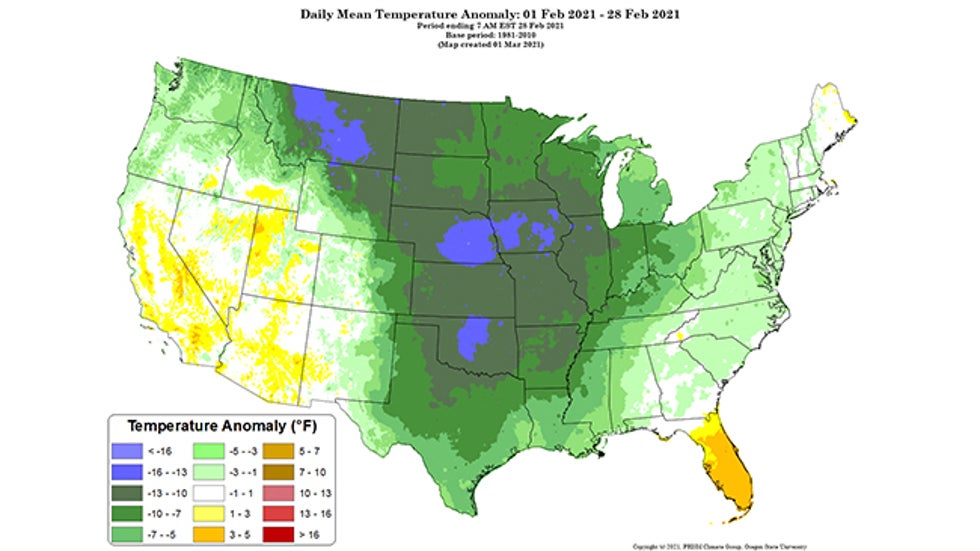Jonathan Erdman
 City of Richardson worker Kaleb Love breaks ice on a frozen fountain Tuesday, Feb. 16, 2021, in Richardson, Texas. Temperatures dropped into the single digits as snow shut down air travel and grocery stores.
City of Richardson worker Kaleb Love breaks ice on a frozen fountain Tuesday, Feb. 16, 2021, in Richardson, Texas. Temperatures dropped into the single digits as snow shut down air travel and grocery stores.February 2021 will go down in history for its crippling cold outbreak, but snowstorms, flooding rain, some record warmth even a strong tornado rounded out the month's extreme weather in the U.S.
This historic cold outbreak first ramped up during the week of Feb. 7, peaked in the days before and after Valentine's Day, then vanished by the following week.
From Feb. 11-16, almost 200 all-time cold records were tied or set in the Plains from the North Dakota-Canadian border to Texas and Louisiana, according to NOAA's National Centers for Environmental Information.
(FULL RECAP: A Frenetic Stretch of Record-Breaking Winter Weather)
Abilene (252 straight hours) and San Angelo, Texas (152 straight hours), smashed their record streaks at or below freezing.
It was the coldest Mardi Gras on record in New Orleans on Feb. 16. Their high temperature (33 degrees) tied their coldest high for February.
Fayetteville, Arkansas, plunged to minus 20 degrees on Feb. 16 and tied a record-long streak below freezing (9 straight days). One week after that frigid low, they were 93 degrees warmer, topping out at 73 degrees on Feb. 23.
SPONSORED: Sale on Patagonia at Paragon Sports
It was the coldest February on record in both Midland and San Angelo, Texas, and the coldest February since 1936 in both Cedar Rapids, Iowa; and Kansas City.
Largely from the cold snap, February as a whole was as much as 15 degrees colder than average in parts of the Plains, a phenomenal temperature anomaly calculated from each day's high and low temperatures over an entire month.
 Departures from average temperatures in Feb. 2021, in degrees Fahrenheit. Parts of the Plains were over 10 degrees colder than average for the month.
Departures from average temperatures in Feb. 2021, in degrees Fahrenheit. Parts of the Plains were over 10 degrees colder than average for the month.Before the cold outbreak dumped into the Lower 48 states, it was bottled up in Alaska.
A wind chill of minus 90 degrees was recorded on Feb. 3 in northern Alaska. One week later, wind chills in the minus 70s were still in place over Alaska's North Slope.
Snow and Rain
We broke down the myriad of snow notables in February in our full recap mentioned earlier, but here are just a few that stood out most.
Both Abilene (9.8 inches) and San Angelo, Texas (10.1 inches) had their all-time record calendar-day snowfalls on Valentine's Day.
Four days later, the tail end of the final winter storm of the February siege set another all-time calendar-day snow record in Del Rio, Texas (11.2 inches).
Back-to-back snowstorms set a February record in San Antonio (6.2 inches), and set an all-time snow on the ground record in Little Rock, Arkansas (15 inches on Feb. 18).
The South didn't have a monopoly on extreme snowfall in February.
Chicago tied its record longest stretch of days with at least 0.1 inch of snow, with 9 straight snowy days.
The month kicked off with a preliminary New Jersey state record three-day snowstorm that will have to be confirmed by a NOAA committee.
February ended with flooding rain in Kentucky, West Virginia and the Ohio Valley.
Bowling Green, Kentucky, smashed its wettest February day, and Booneville, Kentucky, eclipsed its previous flood of record from 1957.
Other February Notables
Cold and snow took most of the oxygen out of the room in February, but some notable warm and dry records were also established.
On the month's final day, Columbia, South Carolina (86 degrees), and Augusta, Georgia (88 degrees), both had their warmest winter days on record, dating to the late 1800s.
That same day, St. Simons Island, Georgia, tied its record highest February dew point, a muggy 70 degrees the likes of which are common in late spring or summer, not a winter month.
On the dry side, Phoenix, Tucson and Yuma, Arizona, didn't pick up any measurable rain in February, tying records.
In eastern Montana, Glasgow (1.5 inches) had its least snowy December-February on record, while Glendive (0.22 inch) had its record driest such period.
While the February tornado count was below average, one deadly tornado in eastern North Carolina on Feb. 15 was a high-end EF3 in Brunswick County.
The Weather Company’s primary journalistic mission is to report on breaking weather news, the environment and the importance of science to our lives. This story does not necessarily represent the position of our parent company, IBM.
The Weather Company’s primary journalistic mission is to report on breaking weather news, the environment and the importance of science to our lives. This story does not necessarily represent the position of our parent company, IBM.

No comments:
Post a Comment